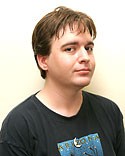I never know what to say when people ask me what my political orientation is. I’ve never felt comfortable calling myself a liberal or a conservative, because I regard both of those terms as basically meaningless.
Nor do I like calling myself a “”leftist”” or a “”right-winger,”” because those define politics exclusively in economic terms. Call me a fool, but there’s something rather dissatisfying about a spectrum that groups Gandhi in with Lenin.
A popular Internet quiz, available at www.politicalcompass.org, adds another dimension, grading you on your belief in personal liberty as well as economic liberty. Thus we have four groups: Authoritarian right, libertarian right, authoritarian left, libertarian right.
In the first group we find Hitler and Margaret Thatcher, in the second Milton Friedman and Barry Goldwater, in the third Stalin and Pope Benedict XVI, and in the fourth Nelson Mandela and the Dalai Lama.
But there’s something dissatisfying about even this “”improved”” version. This is because neither a “”Left”” nor a “”Right”” has ever existed in America. These are outdated terms that have no relevance to American politics.
The terms “”Left”” and “”Right”” date back to the French Revolution, when they referred to the seating arrangement in the French legislature. The royalists sat to the king’s right, while the radicals sat on the left.
It’s not hard to figure out why this spectrum doesn’t work in America. The reason is obvious: There’s no king! Those on the “”Right”” have no one to defend, and those on the “”Left”” have no one to criticize.
Because political classifications are undeniably useful, we ought to figure out just what it is that truly divides us, what it is that some of us defend and some of us oppose.
The Constitution seems like a good bet, at first. But it’s not a particularly useful dividing line, because everyone claims to be on the side of the Constitution. Nor can we point to respect for “”tradition,”” because traditions dry up and blow away overnight in our peculiar country (“”The United States of Amnesia,”” Gore Vidal likes to call it).
Are we divided by class, as Marxists think, or by commitment to the “”free market,”” as classical liberals think? No. Those are ideological standards; they have nothing to do with the reality of life as it is lived in America.
Is it, as libertarians like to say, the difference between those who value “”liberty”” and those who value “”equality””? No, because the two are not rivals, but friends; neither can fully exist without the other. Yet this is an important clue to the real answer.
When Alexis de Tocqueville visited America in the 1830s, he was struck above all by the equality of condition that seemed to exist in the new country. There was no aristocracy, no unbreachable divide between the rich and the poor. Even the poor were not remotely as impoverished and miserable as the poor of Europe.
Traveling through America’s decentralized republic, seeing its townships and farms and cities, Tocqueville came to an important conclusion. Politics for Americans, he said, was divided between those who wished to “”extend”” and those who wished to “”restrict”” popular rule.
Equality of condition, which had never existed in Europe, made it possible for a new standard by which to judge politics. Laws and measures would now be judged not merely on their outcome, but how well they expressed the wishes of the people.
This is the real struggle in American politics, from country to Congress, from supervisor to senator: the struggle between, in Jefferson’s words, “”the many and the few.”” The most significant words in the Constitution are the first three, “”We the People,”” because they announce that this is to be a government that originates in the many, not the few.
The democracy spectrum exposes the “”Left/Right”” spectrum as a myth, because both liberals and conservatives have at times attacked popular rule. Only when we realize this will we at last have democracy in America.
Justyn Dillingham is a senior majoring in political science and history and is the editor-in-chief of the Arizona Summer Wildcat. He is currently at work on a history of the United States. He can be reached at editor@wildcat.arizona.edu.









